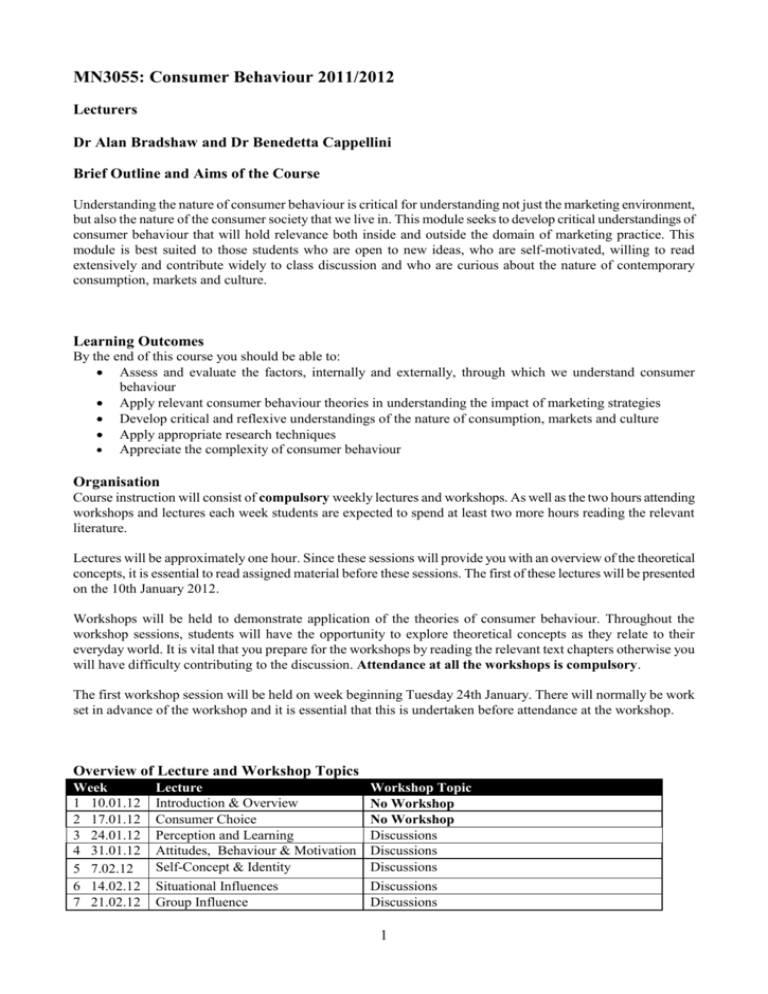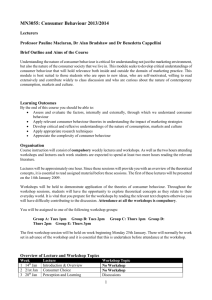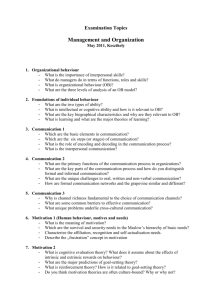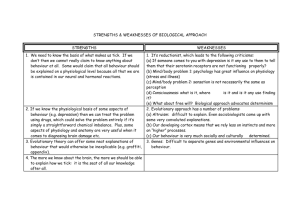MN3055 - Royal Holloway
advertisement

MN3055: Consumer Behaviour 2011/2012 Lecturers Dr Alan Bradshaw and Dr Benedetta Cappellini Brief Outline and Aims of the Course Understanding the nature of consumer behaviour is critical for understanding not just the marketing environment, but also the nature of the consumer society that we live in. This module seeks to develop critical understandings of consumer behaviour that will hold relevance both inside and outside the domain of marketing practice. This module is best suited to those students who are open to new ideas, who are self-motivated, willing to read extensively and contribute widely to class discussion and who are curious about the nature of contemporary consumption, markets and culture. Learning Outcomes By the end of this course you should be able to: Assess and evaluate the factors, internally and externally, through which we understand consumer behaviour Apply relevant consumer behaviour theories in understanding the impact of marketing strategies Develop critical and reflexive understandings of the nature of consumption, markets and culture Apply appropriate research techniques Appreciate the complexity of consumer behaviour Organisation Course instruction will consist of compulsory weekly lectures and workshops. As well as the two hours attending workshops and lectures each week students are expected to spend at least two more hours reading the relevant literature. Lectures will be approximately one hour. Since these sessions will provide you with an overview of the theoretical concepts, it is essential to read assigned material before these sessions. The first of these lectures will be presented on the 10th January 2012. Workshops will be held to demonstrate application of the theories of consumer behaviour. Throughout the workshop sessions, students will have the opportunity to explore theoretical concepts as they relate to their everyday world. It is vital that you prepare for the workshops by reading the relevant text chapters otherwise you will have difficulty contributing to the discussion. Attendance at all the workshops is compulsory. The first workshop session will be held on week beginning Tuesday 24th January. There will normally be work set in advance of the workshop and it is essential that this is undertaken before attendance at the workshop. Overview of Lecture and Workshop Topics Week 1 10.01.12 2 17.01.12 3 24.01.12 4 31.01.12 5 7.02.12 6 14.02.12 7 21.02.12 Lecture Introduction & Overview Consumer Choice Perception and Learning Attitudes, Behaviour & Motivation Self-Concept & Identity Workshop Topic No Workshop No Workshop Discussions Discussions Discussions Situational Influences Group Influence Discussions Discussions 1 8 28.02.12 9 6.03.12 10 13.03.12 Consumption & Culture New Directions in Consumer Research Review Discussions Discussions Discussions Assessment Your overall mark in the course will be comprised of: Individual assignment End of year examination (2hours) 30% 70% Due Thursday 15th March 2011 Date to be announced You are required to submit an electronic copy and a hard copy of the assignment by no later than 12.00 noon on the date of submission. Please note that faxed, e-mailed or posted assignments will not be assessed. For your sake, it is advisable to also keep a file copy of your assignment. You should consult the School of Management Student Handbook 2009/2010 for further details regarding submission of course work, penalties for late assignments, and eligibility to sit the examination. Essay Assignment (30%) – due 12.00 noon on Thursday 15th March The essay is to be 2,000 words in length and must contain a reference list of all sources consulted (not included in word length). Marking will be on the basis of research effort, content, argument effectiveness and writing style. The options for the individual assignment are as follows: 1. Using examples, provide a critical overview of how sensory stimuli are deployed in retail spaces and/or advertisements. 2. Critically evaluate the statement that “consumers are free to choose”. 3. With reference to theories of social capital, explore relationships between food consumption (or disposal) and social class. Recommended Text Books The assigned readings to prepare for the lecture each week are taken from: Solomon, M., Bamossy, G., Askegaard, S. and M.K. Hogg (2009) Consumer Behaviour: A European Perspective, Prentice-Hall: New Jersey. (ISBN 0-273-68752-2) 338.75834 SOL This book is available at the College Bookshop. An Internet site that may be of assistance for sourcing relevant readings is www.chapmanrg.com/IMR. Other sites for journal articles are: www.amsreview.org, http://www.acrwebsite.org/volumes, http://oxygen.vancouver.wsu.edu/csdcb/home.htm There are a number of excellent Consumer Behaviour texts that cover similar material, albeit at different intellectual levels and from alternative perspectives. Some of these are listed here: Desmond, J. (2003) Consumer Behaviour, Palgrave: London,(ISBN 0-333-04992-7) Schiffman, L.G. and L.L. Kanuk (1999) Consumer Behavior, Prentice-Hall: New Jersey. (ISBN 0130841293) 338.75834 SCH Chisnall, P.M. (1994) Consumer Behaviour, 3rd edition, McGraw-Hill: London. (ISBN 0030211085) 2 338.75834 CHI Engel, J.F., R.D. Blackwell and P.W. Miniard, Consumer Behaviour, 7th or 8th edition, The Dryden Press. (ISBN 0030211085) 338.75834 ENG Assael, H., 1998. Consumer Behaviour and Marketing Action, 6th edition, PWS-Kent: Massachusetts. (ISBN 0538867701) 338.75834 ASS Foxall, G.R., Goldsmith, R.E. and Brown, S. (1998) Consumer Psychology for Marketing, Thomson Business Press: London. (ISBN 1861523718) 338.758 FOX In the Bedford Library is an interesting and classic text, which takes a critical view of marketers (referring to them as the 'depth manipulators'), is the following: Packard, V., (1981) The Hidden Persuaders, Penguin Books: London. 301.154 PAC In addition a wonderful piece of writing which explores consumer culture and does so set in Brooklands, an area very close to Egham, is Kingdom Come by the great writer JG Ballard. Ballard, JG, (2007) Kingdom Come, Harper Perennial: London. 828 BAL You are also encouraged to consult consumer behaviour, advertising and marketing related publications on a regular basis. Some of these are Journal of Consumer Research, Journal of Consumer Culture, Consumption, Markets & Culture, Marketing Theory and the Journal of Macromarketing. . N.B. Please ensure that you keep all course outlines as they will prove valuable in obtaining exemptions for postgraduate qualifications, e.g. CIM and useful for future employers. Note that the Department only keep previous year's outlines for a limited period. 3






